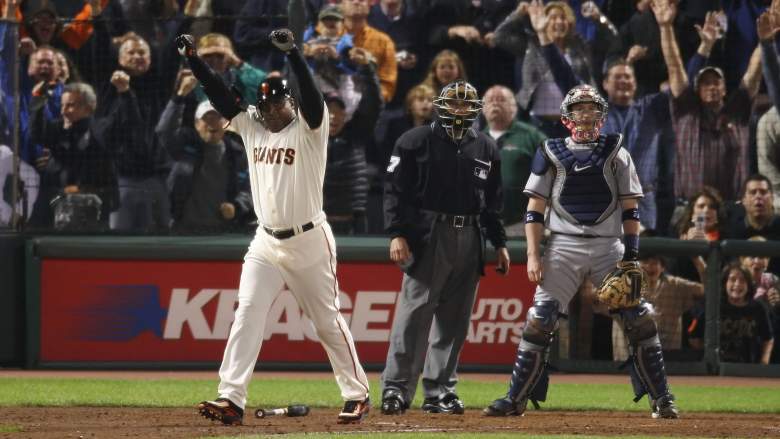
Barry Bonds has more home runs than any player in the history of Major League Baseball, but he’s no longer worried about his Hall of Fame exclusion.
The former San Francisco Giants slugger retired in 2007 as arguably the most decorated hitter of all-time. His involvement in the BALCO scandal of the early 2000s and continuous allegations of steroid use, however, tainted his numbers in the eyes of Hall of Fame voters.
Bonds was inducted into the Pittsburgh Pirates Hall of Fame on Saturday, where he spoke to reporters about his absence from Cooperstown.
“I don’t have to worry about those things no more in my life,” Bonds told the Associated Press. “[I want to] hang around my grandchildren and my children. Those hopes, I don’t have them anymore. I hope to breathe tomorrow [and see] if I can make it to 61.”
The Pirates honored Bonds and his former manager, Jim Leyland, who was effusive in his praise for the guy who came up in Pittsburgh.
“Hey, we grew up together,” Leyland said, per Alex Stumpf of MLB.com. “He was a rookie player. I was a rookie manager. So we suffered some time to learn the game up here at this level, to learn what it took to play at this level. I needed to find out what it took to manage at this level. But we were always together.”
Barry Bonds Changed His Tune on the Hall of Fame — and the Media
Bonds may not be worrying about the Hall of Fame today, but that wasn’t always the case. He told MLB.com’s Barry Bloom in 2013 that no matter what he said at the time, the snub meant something to him.
“I do really care,” Bonds said. “I may say I don’t, but I do really care. I’ve been through a lot in my life so not too many things bother me. Making the Hall of Fame, would it be something that’s gratifying because of what I’ve sacrificed? Sure. Baseball has been a big part of our lives. We’ve sacrificed our bodies. It’s the way we made our living.”
As Bonds’ public image suffered in the latter stages of his career, the aging Giants outfielder did himself no favors. His public persona came off as arrogant at best and at many times rude or standoffish around the media.
Bonds admitted in a 2016 interview with Sports on Earth that he regretted the way he acted toward media, saying it cost him endorsements.
“I just said, ‘I’ve created this fire around me, and I’m stuck in it, so I might as well live with the flames,’” he said.
Hall of Fame or Not, Bonds Had an All-Time Career
Despite only leading MLB in home runs twice in his 22-year career, Bonds swatted 762 career homers, edging out Hank Aaron’s 755 to become the all-time leader.
The key was consistency. He hit 33 or more every season from 1992 to 2004. That earned him six of his seven MVP awards in that span (his first came in 1990, his first 30-plus-home-run season). Overall Bonds, was also a 14-time All-Star, 12-time Silver Slugger, and two-time National League batting champion.
By the time he hit his record-setting 73 home runs in 2001, he became such a feared hitter that he easily led the league in walks and intentional walks almost every year. By the end, he led the NL in walks and intentional walks 12 times each. He retired as the all-time leader in both categories.
That combination of walks and homers led to some truly eye-popping on-base numbers. From 2001 to 2004, his worst OBP was an absurd .515. His .609 OBP in 2004 is a record and his .582 mark in 2002 is good for second place. In fact, Bonds owns three of the top-10 best single-season on-base percentages ever. He is the only player to crack Baseball-Reference’s top 24 OBP seasons who played after 1968.
The walks and homers, rightfully, are what most fans remember him for. Few (outside of maybe Pirates and Giants fans) remember him also as an elite fielder and base-stealing threat. He swiped 514 bags in his career, including a career-high 52 in 1990 with the Pirates and a 40-40 season with the Giants in 1996 (42 home runs, 40 steals). Bonds was also an eight-time Gold Glove outfielder, winning his last one in 1998, his age 33 season.
Comments
Barry Bonds No Longer Worries About the Baseball Hall of Fame